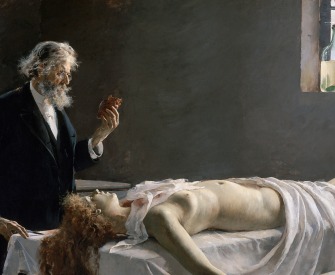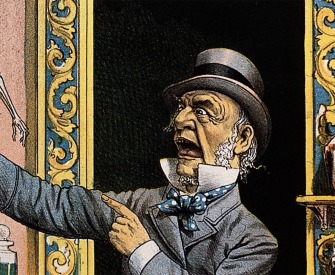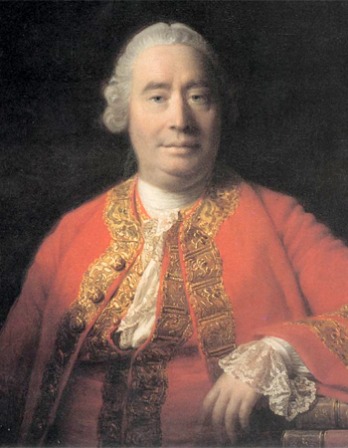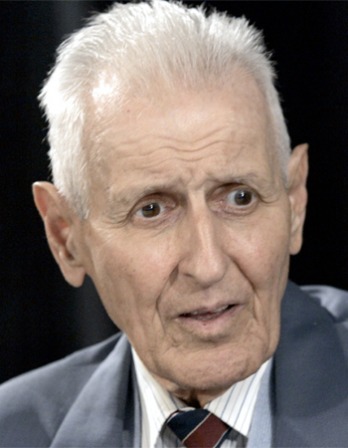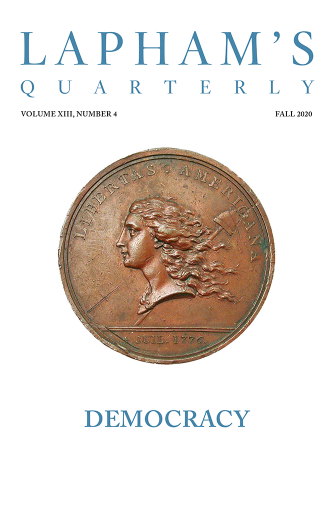Credulity forges more miracles than trickery could invent.
—Joseph Joubert, 1811It’s All a Swindle
H.G. Wells has a product to push.
“Gettin’ lunchtime, George,” my uncle said. “You’d better come and have lunch with me!”
“How’s Aunt Susan?” I asked.
“Exuberant. Never saw her so larky. This has bucked her up something wonderful—all this.”
“All what?”
“Tono-Bungay.”
“What is Tono-Bungay?” I asked.
My uncle hesitated. “Tell you after lunch, George,” he said. “Come along!” and having locked up the sanctum after himself, led the way along a narrow, dirty pavement, lined with barrows and swept at times by avalanche-like porters bearing burdens to vans, to Farringdon Street. He hailed a passing cab superbly, and the cabman was infinitely respectful. “Schäfer’s,” he said, and off we went side by side—and with me more and more amazed at all these things—to Schäfer’s Hotel, the second of the two big places with huge lace-curtain-covered windows, near the corner of Blackfriars Bridge.
I will confess I felt a magic charm in our relative proportions as the two colossal, pale-blue-and-red liveried porters of Schäfer’s held open the inner doors for us with a respectful salutation that in some manner they seemed to confine wholly to my uncle. Instead of being about four inches taller, I felt at least the same size as he, and very much slenderer. Still more respectful waiters relieved him of the new hat and the dignified umbrella, and took his orders for our lunch. He gave them with a fine assurance.
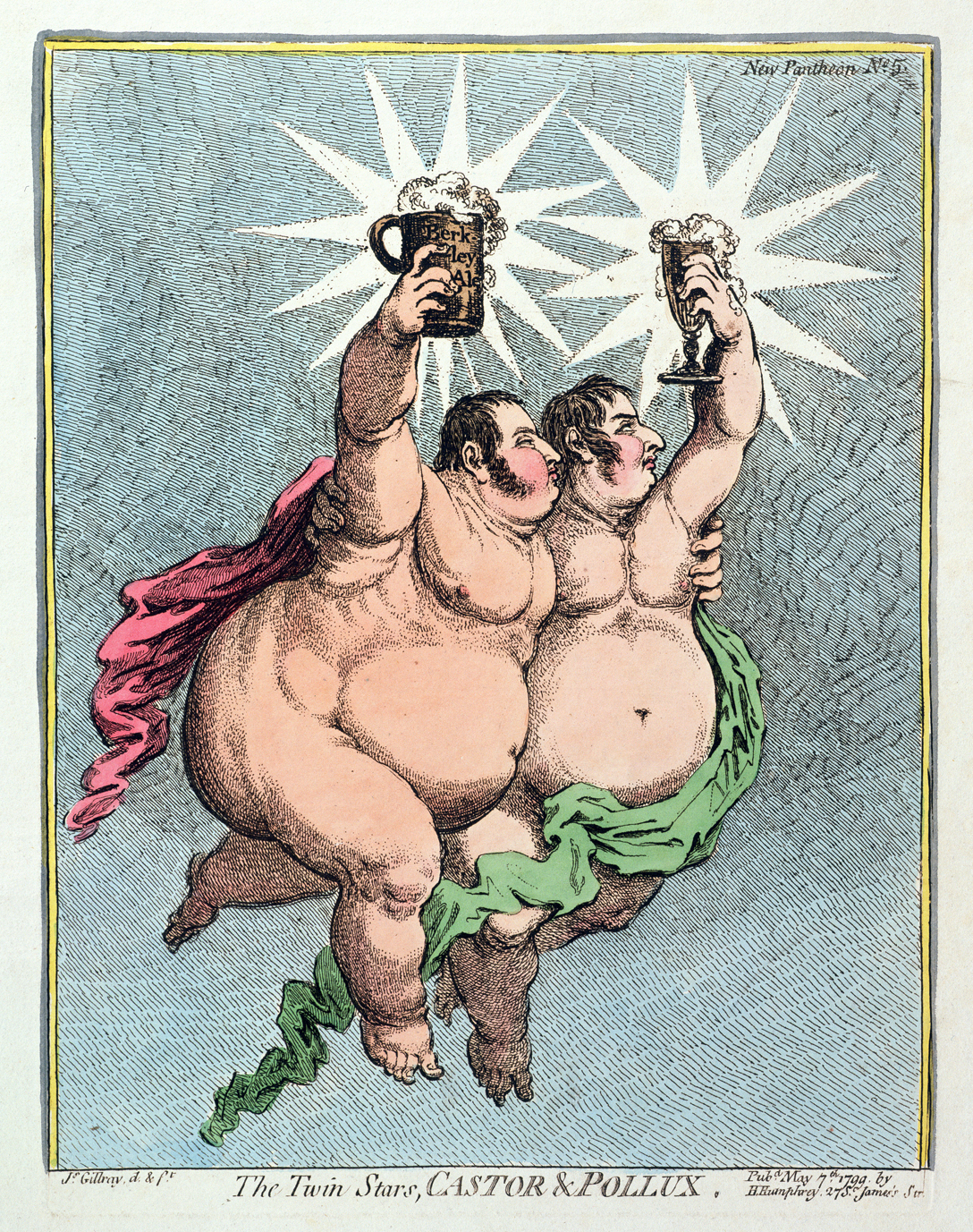
The Twin Stars, Castor & Pollux, by James Gillray, 1799. From a series caricaturing Whig Party members as pagan deities.
He nodded to several of the waiters.
“They know me, George, already,” he said. “Point me out. Live place! Eye for coming men!”
The detailed business of the lunch engaged our attention for a while, and then I leaned across my plate. “And now?” said I.
“It’s the secret of vigor. Didn’t you read that label?”
“Yes, but—”
“It’s selling like hotcakes.”
“And what is it?” I pressed.
“Well,” said my uncle, and then leaned forward and spoke softly under cover of his hand, “It’s nothing more or less than…”
(But here an unfortunate scruple intervenes. After all, Tono-Bungay is still a marketable commodity and in the hands of purchasers, who bought it from—among other vendors—me. No! I am afraid I cannot give it away.)
“You see,” said my uncle in a slow confidential whisper, with eyes very wide and a creased forehead, “it’s nice because of the” (here he mentioned a flavoring matter and an aromatic spirit), “it’s stimulating because of” (here he mentioned two very vivid tonics, one with a marked action on the kidney). “And the” (here he mentioned two other ingredients) “makes it pretty intoxicating. Cocks their tails. Then there’s” (but I touch on the essential secret). “And there you are. I got it out of an old book of recipes—all except the” (here he mentioned the more virulent substance, the one that assails the kidneys), “which is my idea. Modern touch! There you are!”
He reverted to the direction of our lunch.
Presently he was leading the way to the lounge—a sumptuous place in red morocco and yellow glazed crockery, with incredible vistas of settees and sofas and things, and there I found myself grouped with him in two excessively upholstered chairs with an earthenware Moorish table between us bearing coffee and Benedictine, and I was tasting the delights of a ten-penny cigar.
“I want to let you into this”—puff—“George,” said my uncle round the end of his cigar. “For many reasons.”
His voice grew lower and more cunning. He made explanations that to my inexperience did not completely explain. I retain an impression of a long credit and a share with a firm of wholesale chemists, of a credit and a prospective share with some pirate printers, of a third share for a leading magazine and newspaper proprietor.
“I played ’em off one against the other,” said my uncle. I took his point in an instant. He had gone to each of them in turn and said the others had come in.
“I put up four hundred pounds,” said my uncle, “myself and my all. And you know—”
He assumed a brisk confidence. “I hadn’t five hundred pence. At least—”
For a moment he really was just a little embarrassed. “I did,” he said, “produce capital. You see, there was that trust affair of yours—I ought, I suppose—in strict legality—to have put that straight first. Zzzz…
“It was a bold thing to do,” said my uncle, shifting the venue from the region of honor to the region of courage. And then with a characteristic outburst of piety, “Thank God it’s all come right!
“And now, I suppose, you ask where do you come in? Well, fact is I’ve always believed in you, George. You’ve got—it’s a sort of dismal grit. Bark your shins, rouse you, and you’ll go! You’d rush any position you had a mind to rush. I know a bit about character, George—trust me. You’ve got—” He clenched his hands and thrust them out suddenly, and at the same time said, with explosive violence, “Wooosh! Yes. You have! The way you put away that Latin at Wimblehurst; I’ve never forgotten it. Wo-oo-oo-osh! Your science and all that! Wo-oo-oo-osh! I know my limitations. There’s things I can do, and” (he spoke in a whisper, as though this was the first hint of his life’s secret) “there’s things I can’t. Well, I can create this business, but I can’t make it go. I’m too voluminous—I’m a boiler-over, not a simmering stick-at-it. You keep on hotting up and hotting up. Papin’s digester. That’s you, steady and long and piling up—then, wo-oo-oo-oo-osh. Come in and stiffen these niggers. Teach them that wo-oo-oo-oo-osh. There you are! That’s what I’m after. You! Nobody else believes you’re more than a boy. Come right in with me and be a man. Eh, George? Think of the fun of it—a thing on the go—a Real Live Thing! Wooshing it up! Making it buzz and spin! Whoo-oo-oo”—he made alluring expanding circles in the air with his hand. “Eh?”
His proposal, sinking to confidential undertones again, took more definite shape. I was to give all my time and energy to developing and organizing. “You shan’t write a single advertisement, or give a single assurance,” he declared. “I can do all that.” I was to have three hundred a year. Three hundred a year. (“That’s nothing,” said my uncle, “the thing to freeze onto, when the time comes, is your tenth of the vendor’s share.”)
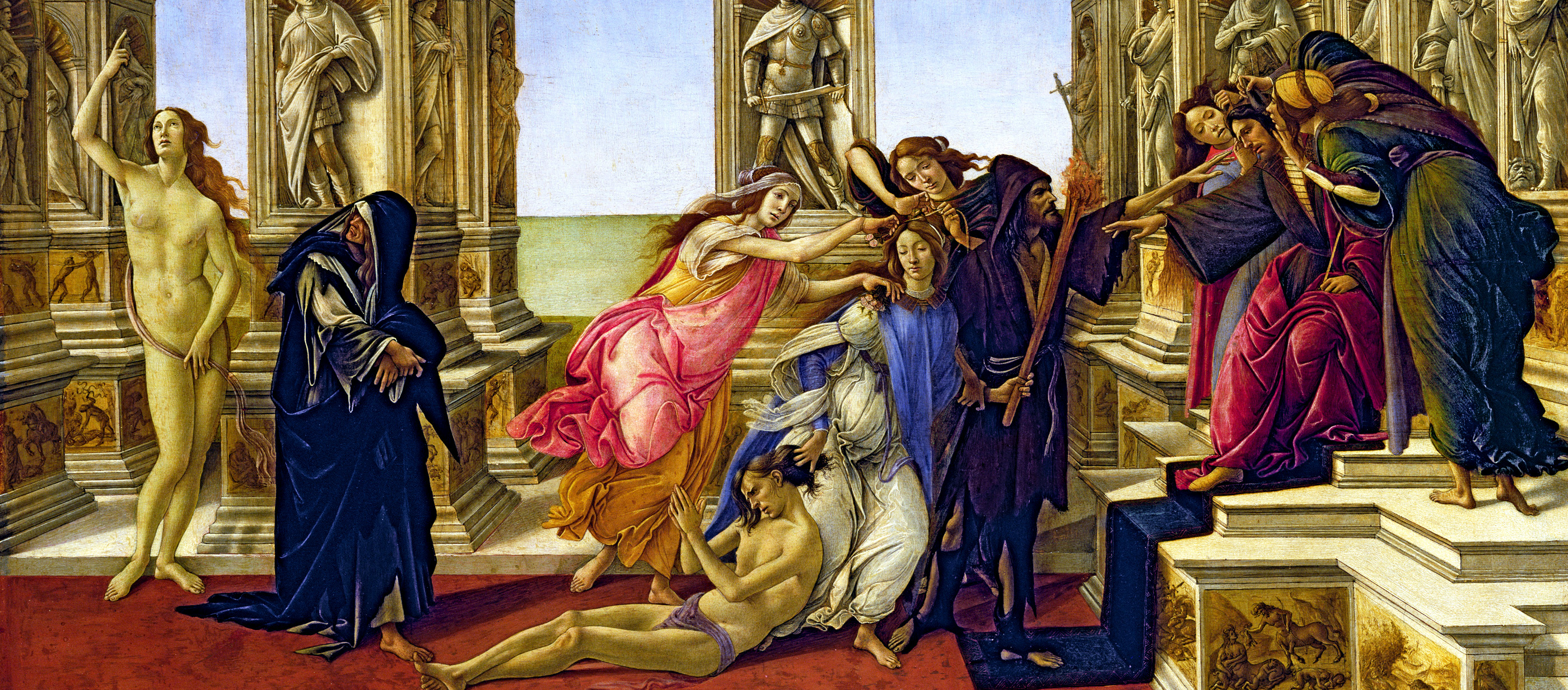
The Calumny of Apelles, by Sandro Botticelli, c. 1495. Deceit, Treachery, and Calumny (led by Envy) drag a young man before King Midas (flanked by Ignorance and Suspicion) while Remorse turns to look at naked Truth.
Three hundred a year certain, anyhow! It was an enormous income to me. For a moment I was altogether staggered. Could there be that much money in the whole concern? I looked about me at the sumptuous furniture of Schäfer’s Hotel. No doubt there were many such incomes.
My head was spinning with unwonted Benedictine and burgundy.
“Let me go back and look at the game again,” I said. “Let me see upstairs and round about.”
I did.
“What do you think of it all?” my uncle asked at last. “Well, for one thing,” I said, “why don’t you have those girls working in a decently ventilated room? Apart from any other consideration, they’d work twice as briskly. And they ought to cover the corks before labeling round the bottle—”
“Why?” said my uncle.
“Because—they sometimes make a mucker of the cork job, and then the label’s wasted.”
“Come and change it, George,” said my uncle, with sudden fervor. “Come here and make a machine of it. You can. Make it all slick, and then make it woosh. I know you can. Oh! I know you can.”
I seem to remember very quick changes of mind after that lunch. The muzzy exaltation of the unaccustomed stimulants gave way very rapidly to a model of pellucid and impartial clairvoyance which is one of my habitual mental states. It is intermittent; it leaves me for weeks together, I know, but back it comes at last like justice on circuit, and calls up all my impressions, all my illusions, all my willful and passionate proceedings. We came downstairs again into that inner room which pretended to be a scientific laboratory. My uncle pressed a cigarette on me, and I took it and stood before the empty fireplace while he propped his umbrella in the corner, deposited the new silk hat that was a little too big for him on the table, blew copiously, and produced a second cigar.
“Well, George!” he said, “what do you think of it all?”
“Well,” I said, “in the first place—it’s a damned swindle!”
“Tut! Tut!” said my uncle. “It’s as straight as—it’s fair trading!”
“So much the worse for trading,” I said.
“It’s the sort of thing everybody does. After all, there’s no harm in the stuff—and it may do good. It might do a lot of good—giving people confidence, f’rinstance, against an epidemic. See? Why not? I don’t see where your swindle comes in.”
“H’m,” I said. “It’s a thing you either see or don’t see.”
“I’d like to know what sort of trading isn’t a swindle in its way. Everybody who does a large advertised trade is selling something common on the strength of saying it’s uncommon. Look at Chickson—they made him a baronet. Look at Lord Radmore, who did it on lying about the alkali in soap! Rippin’ ads those were of his too!”
“You don’t mean to say you think doing this stuff up in bottles and swearing it’s the quintessence of strength and making poor devils buy it at that, is straight?”
“Why not, George? How do we know it mayn’t be the quintessence to them so far as they’re concerned?”
“Oh!” I said, and shrugged my shoulders.
“There’s faith. You put faith in ’em…I grant our labels are a bit emphatic. Christian Science, really. No good setting people against the medicine. Tell me a solitary trade nowadays that hasn’t to be—emphatic. It’s the modern way! Everybody understands it—everybody allows for it.”
“But the world would be no worse and rather better if all this stuff of yours was run down a conduit into the Thames.”
Anyone who’s never experienced the pleasure of betrayal doesn’t know what pleasure is.
—Jean Genet, 1986“Don’t see that, George, at all. ’Mong other things, all our people would be out of work. Unemployed! I grant you Tono-Bungay may be—not quite so good a find for the world as Peruvian bark, but the point is, George—it makes trade! And the world lives on trade. Commerce! A romantic exchange of commodities and property. Romance. ’Magination. See? You must look at these things in a broad light. Look at the wood—and forget the trees! And hang it, George! We got to do these things ! There’s no way unless you do. What do you mean to do—anyhow?”
“There’s ways of living,” I said, “without either fraud or lying.”
“You’re a bit stiff, George. There’s no fraud in this affair, I’ll bet my hat. But what do you propose to do? Go as chemist to someone who is running a business, and draw a salary without a share like I offer you. Much sense in that! It comes out of the swindle—as you call it—just the same.”
“Some businesses are straight and quiet, anyhow; supply a sound article that is really needed, don’t shout advertisements.”
“No, George. There you’re behind the times. The last of that sort was sold up ’bout five years ago.”
“Well, there’s scientific research.”
“And who pays for that? Who put up that big City and Guilds place at South Kensington? Enterprising businessmen! They fancy they’ll have a bit of science going on, they want a handy expert ever and again, and there you are! And what do you get for research when you’ve done it? Just a bare living and no outlook. They just keep you to make discoveries, and if they fancy they’ll use ’em they do.”
“One can teach.”
“How much a year, George? How much a year? I suppose you must respect Carlyle! Well—you take Carlyle’s test—solvency. (Lord! What a book that French Revolution of his is!) See what the world pays teachers and discoverers and what it pays businessmen! That shows the ones it really wants. There’s a justice in these big things, George, over and above the apparent injustice. I tell you it wants trade. It’s trade that makes the world go round! Argosies! Venice! Empire!”
My uncle suddenly rose to his feet.
“You think it over, George. You think it over! And come up on Sunday to the new place—we got rooms in Gower Street now—and see your aunt. She’s often asked for you, George—often and often, and thrown it up at me about that bit of property—though I’ve always said and always will, that twenty-five shillings in the pound is what I’ll pay you and interest up to the nail. And think it over. It isn’t me I ask you to help. It’s yourself. It’s your aunt Susan. It’s the whole concern. It’s the commerce of your country. And we want you badly. I tell you straight, I know my limitations. You could take this place, you could make it go! I can see you at it—looking rather sour. Woosh is the word, George.”

H.G. Wells
From Tono-Bungay. Sinclair Lewis, who named his first son Wells in homage to the author, found this work, which takes as some of its subjects the rise of advertising and the proliferation of bunk patent medicines in the early twentieth century, to be the “liveliest of novels.” Wells worked as an apprentice to a draper and an assistant to a chemist before winning a scholarship at the age of eighteen that allowed him to study with the biologist T. H. Huxley. He published his first book, Textbook of Biology, in 1893 and his first novel, The Time Machine, in 1895. “It’s my trump card,” he wrote to a friend about the novel, which became an immediate success.
